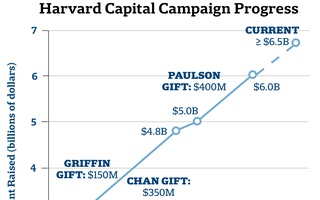University President Drew G. Faust is refocusing Harvard’s $6.5 billion capital campaign two years after its launch. She said Tuesday that she wants to target future fundraising at campaign priorities that have not yet attracted major giving.
“We’re going to refocus our energies on the aspects of the campaign that haven’t entirely met the aspirations that we had for them,” she said in an interview, specifically mentioning fundraising efforts at the Graduate School of Education, Harvard Divinity School, and Harvard Medical School. {shortcode-e6c229eedc792ca22c7d5425f4f3e487dd523b5e}
Launched publicly in September 2013, Harvard’s record-setting fundraising drive has already raised more than $5 billion in gifts and pledges. The campaign has articulated a number of goals, including financial aid, developing a science complex in Allston, and College House renewal.
Since administrators last released campaign numbers early this year, Harvard has taken in a record-breaking $400 million pledge. If the University continued to fundraise at a level consistent with its pre-public phase pace, the campaign total would now be in the area of $6 billion.
“We’ve done really, really well,” Faust said. “We’ve had another terrific year, and so we’re very excited about all we’ve accomplished with the campaign.”
Occasionally, when institutions near their targets ahead of schedule, they raise their targets to encourage more giving. For Columbia’s most recent capital campaign that ended in 2013, the university’s trustees increased its goal four years in from $4 billion to $5 billion. But on Tuesday, Faust said Harvard administrators have no plans to raise their goal.
Faust said she wants to focus on the Ed School because it got off to a late fundraising start as it underwent a leadership transition around the launch of the campaign. Faust also said she has higher hopes for the Divinity School, which does not have as many donors in financially lucrative professions compared to other schools. She added that she wants to “drill down” on the Medical School, which recently revamped its curriculum.
One way Faust has incentivized big-ticket gifts is by allowing donors to rename the schools to which they direct their money. Gerald L. Chan bought naming rights to the School of Public Health for $350 million, renaming it in honor of his father T.H. Chan, and it took a $400 million gift—the largest donation in Harvard’s history—from hedge fund mogul John A. Paulson to rename the School of Engineering and Applied Sciences.
“As we thought about the possibility of these naming gifts we wanted to make sure that these gifts could have a transformative effect that would be worthy of long-term recognition,” she said.
Not everyone condones giving to the world’s richest university. Criticism erupted after news of the $400 million Paulson gift, arguing that the money exacerbates the wealth inequality in higher education and could better serve other causes. In her interview with The Crimson, Faust addressed critics of the campaign, saying that many of them are ill-informed about how endowments work. Harvard is not hoarding money in its $35.9 billion endowment, she said, because it often receives donations allocated to specific professorships or programs.
“One of the things that I found most disturbing about those criticisms is that first of all it’s an act of extraordinary generosity. [Paulson] is not spending his millions on something frivolous,” Faust said. “To be greeted with such skepticism and criticism for an act of generosity seems to me to be unfair and extreme.”
With three more years to go in the campaign's public phase, Faust seems determined not to lose steam on the fundraising drive. Yet as the capital campaign charges along, there are still not plans to raise its goal.
—Staff writer Mariel A. Klein can be reached at mariel.klein@thecrimson.com. Follow her on Twitter @mariel_klein.Read more in University News
Faust Puts Final Clubs on NoticeRecommended Articles
-
 Harvard’s Capital Campaign Crosses $6 Billion Mark
Harvard’s Capital Campaign Crosses $6 Billion Mark -
 Overall Target in Reach, Smaller Campaign Goals Remain
Overall Target in Reach, Smaller Campaign Goals Remain -
 With At Least $6.5 Billion Raised, Harvard Sets Higher Education Fundraising Record
With At Least $6.5 Billion Raised, Harvard Sets Higher Education Fundraising Record -
 Goal In Hand, Harvard Campaign Polishes Priorities
Goal In Hand, Harvard Campaign Polishes Priorities -
Capital Campaign Total Hits $8 Billion With Year to GoWith a year still remaining in its record-shattering capital campaign, Harvard has raised $8 billion in donations.













